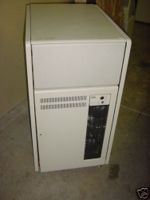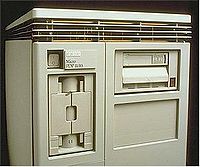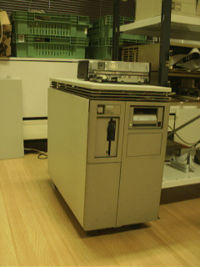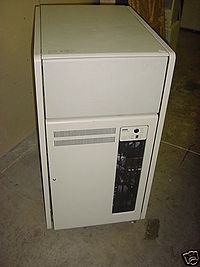Difference between revisions of "PDP-11/84"
| Line 11: | Line 11: | ||
The box on the picture to the left is a BA123 which was a popular enclosure for qbus machines. Apart from the 12x4-slot qbus backplane, it had five slots for storage units, e.g. room for two or three harddisks, a tape drive ([[TK50]] here) and floppy. | The box on the picture to the left is a BA123 which was a popular enclosure for qbus machines. Apart from the 12x4-slot qbus backplane, it had five slots for storage units, e.g. room for two or three harddisks, a tape drive ([[TK50]] here) and floppy. | ||
</i> | </i> | ||
| + | |||
| + | == Gallery == | ||
| + | [[Image:pdp11-83.jpg|200px|A PDP-11/83]] | ||
| + | [[Image:PDP11-84.JPG|200px|A PDP-11/84]] | ||
{{PDP-11}} | {{PDP-11}} | ||
[[Category:DEC processors]][[Category:UNIBUS processors]] | [[Category:DEC processors]][[Category:UNIBUS processors]] | ||
Revision as of 16:29, 4 May 2011
hampage.hu
Quoting: Introduced in 1988. Based on the J-11 chip, DEC originally wanted the clock speed to be 20MHz, but it couldn't be done on time, so the actual speed was 18MHz. It was the fastest CPU of the PDP-11's anyhow. The high-end configuration had 4MB RAM on PMI (Private Memory Interconnect) and a floating-point accelerator.
The UNIBUS-based PDP-11/84 was for those customers, who wanted more I/O throughput or had some legacy equipment: it was the same (qbus) CPU board with a KTJ-11B UNIBUS adapter.
The box on the picture to the left is a BA123 which was a popular enclosure for qbus machines. Apart from the 12x4-slot qbus backplane, it had five slots for storage units, e.g. room for two or three harddisks, a tape drive (TK50 here) and floppy.
Gallery
| v • d • e PDP-11 Computers and Peripherals |
|---|
| UNIBUS PDP-11s - PDP-11/20 • PDP-11/15 • PDP-11/35 • PDP-11/40 • PDP-11/45 • PDP-11/50 • PDP-11/55 • PDP-11/70 PDP-11/05 • PDP-11/10 • PDP-11/04 • PDP-11/34 • PDP-11/60 • PDP-11/44 • PDP-11/24 • PDP-11/84 • PDP-11/94 QBUS PDP-11s - PDP-11/03 • PDP-11/23 • PDP-11/23+ • MicroPDP-11/73 • MicroPDP-11/53 • MicroPDP-11/83 • MicroPDP-11/93 QBUS CPUs: LSI-11 • LSI-11/2 • KDF11-A • KDF11-B • KDJ11-A • KDJ11-B • KDJ11-D • KDJ11-E Buses: UNIBUS • UNIBUS map • SPC • MUD • EUB • QBUS • CD interconnect • PMI Also: PDP-11 architecture • PDP-11 Extended Instruction Set • FP11 floating point • PDP-11 Memory Management |
| UNIBUS CPUs: KA11 • KC11 • KB11-A • KB11-B • KB11-C • KB11-D • KD11-A • KD11-B • KD11-D • KD11-E • KD11-EA • KD11-K • KD11-Z • KDF11-U
Co-processors: FP11-A • FP11-B • FP11-C • FP11-E • FP11-F • KE44-A • FPF11 Chips: LSI-11 • KEV11-A • KEV11-B • KEV11-C • F-11 • KEF11-A • KTF11-A • T-11 • J-11 • FPJ11 CPU options: KE11-E • KE11-F • KJ11-A • KT11-C • KT11-D • KK11-A • KK11-B • KT24 • KTJ11-B Rare CPU options: KS11 Memory Protection and Relocation option • KT11-B Paging Option • KUV11 Writeable Control Store Front panels: KY11-A • KY11-D • KY11-J • KY11-LA • KY11-LB • KY11-P More on buses: UNIBUS and QBUS termination • Bus Arbitration on the Unibus and QBUS • CTI BUS PDT-11s - PDT-11/110 • PDT-11/130 • PDT-11/150 CTI PDP-11s - PRO-325 • PRO-350 • PRO-380 Other: FIS floating point • PDP-11 Commercial Instruction Set • PDP-11 stacks • PDP-11 family differences |



